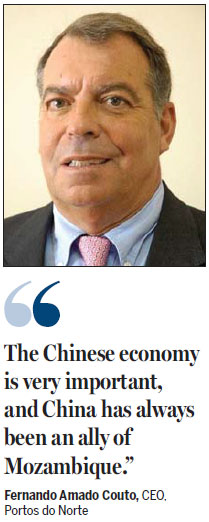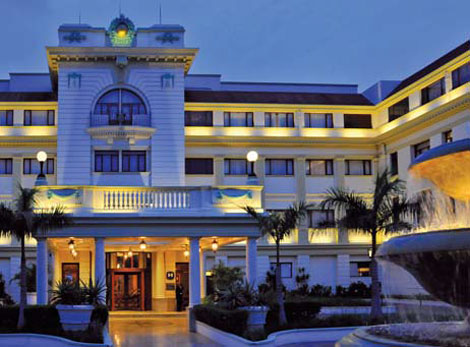First port of call for African growth
Mozambique is on the fast track to growth thanks to investment from Chinese partners
Although Mozambique possesses abundant natural resources, the government knows the country needs a fully diversified economy to thrive, which is why they are actively seeking investment in key sectors around the country. The need to spread growth throughout the country is a primary concern. Although the civil war finished 23 years ago, internal divisions have been difficult to overcome, prompting newly elected President Filipe Nyusi to call for inclusivity from, and for, all citizens.
As Mozambique expands its hydrocarbons sector and increases the land available to local producers and international investors, vital improvements need to be made before its potential can be realized.
|
Polana Serena Hotel. Photos Provided to China Daily |
Prime examples are the ports of Beira and Nacala. Beira, for example, located in the center of the country, is very strategically placed in terms of its access to the Mozambican hinterlands and to landlocked countries such as Zimbabwe, Botswana, Zambia, Malawi and the Democratic Republic of Congo. Carlos Mesquita, Minister of Transport, and former managing director of Cornelder de Moambique, owners of the port, understands that the prime location has the potential to lead to massive growth, specifically in industries that investors are seeking out, such as agriculture and associated products, particularly fertilizer, exports of which are on course to more than triple from 2,000 tons per ship per day to 7,000 tons, translating to 1 million tons per year.
Coupled with that, year-on-year freight growth of some 15 percent, which equates to 90,000 containers and almost 2.5 million tons, alongwith ever-improving rail and road links to the interior, the port looks set to play an important role in the logistics industry.
Mesquita explains: "Important commodities for China, such as rice, come through the Port of Beira. This is a sector where China can play a key role in the development of Mozambique if a program of cooperation is established.
"The Chinese are also involved in transport and logistics sectors in Beira. There is also a lot of Chinese machinery here, and at the port we have already changed our heavy machinery to Chinese equipment."
When the importance of the energy sector is taken into account, there is a sense the country is on the cusp of a boom at the center of the logistics chain in the Indian Ocean.
The Port of Nacala is also blessed with an excellent location, a natural deep-water port without restrictions on ship movement or size, and owners keen to see the importance of the region grow alongside the country. Based in a Special Economic Zone, and with an international airport under construction, Nacala will see its importance rise as a pivotal hub for trade.
Fernando Amado Couto, CEO of Portos do Norte understands this as a prime driver for prospective investment.

"There is no doubt Nacala Port will be a key point for any investment project that requires port infrastructure," he said. "It is considered a free zone for trade, so our aim is to continue with the acquisition of equipment made in China to facilitate easy export. Last year for example, the Port of Nacala, which happens to be the newest port in Mozambique, had record numbers of freight and ship handling."
Infrastructure benefits all
Tourism is also dependent on better infrastructure, as Miguel Afonso dos Santos, general manager of the Polana Serena, one of Africa's most luxurious and well- appointed hotels, understands only too well.
"People come to Mozambique for many reasons, and infrastructure is both a method of entry, and an area for investment for some of our guests," he said. "The nature of the business has changed. Today the demand is 90 percent corporate, business people, investors, people trying to see if there are opportunities to invest," he said.
He also recognizes that the country's oil and gas revenues will, as well as helping growth, also allow Mozambique to maintain and build on its unique tourist attractions.
Another major draw of Mozambique is its huge and varied coastline, which stretches 2,470 kilometers, presenting huge opportunities for marine-based industries, such as aquaculture and traditional fishing, an area the government is strengthening as a driver of the economy, through the creation of Ematum, the national tuna fishing agency.
In a 2014 interview with InFocus former Minister of Fisheries, Victor Borges, said: "As a member of the Indian Ocean Tuna Commission (IOTC), we risked losing our tuna-fishing quota if we didn't develop a sustainable industry. The business viability studies we had done had indicated that we could earn about $200 million annually, if we put in place a fleet of about 20 vessels. Based on that, a strategic plan was approved in May 2013 to establish a national tuna fleet of 150 vessels and in 2014, we produced more than 200,000 tons of tuna products."
This focus, on improving productivity, will surely see Mozambique catapulted towards prosperity and a proud future.
InFocus provided the story.
(China Daily 03/11/2015 page6)















